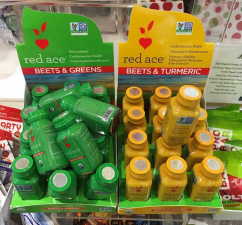Wellness, Sustainability Driving Demand for Natural & Organic 9/22/2017
During the course of the year, among the top trends noted by retailers and suppliers attending virtually every ECRM Grocery session – whether Candy, Snack & Dry Grocery, or Beverages – were related to products with natural or organic ingredients. So I was curious to see what the key trends were at our recent Natural, Organic & Specialty Foods EPPS, in which just about every supplier was showcasing products of this sort.
Interestingly, the top trends noted by attendees fell into a few key areas. The functional beverages category was overwhelmingly cited by retailers and suppliers, particularly those that contained turmeric, the East-Asian spice known for its many health benefits, and is increasingly making its way into foods across all grocery categories. Other beverages noted were apple cider vinegar, and charcoal-infused beverages. (Charcoal is another newly-trending ingredient aimed at health-minded consumers for its detoxifying benefits, not just in food, but with skin care applications, as well.)
Indeed, according to Edricco Reina, Director of Retail Partnerships for market research firm SPINS, who spoke at the EPPS (download his slide presentation here), sales of natural refrigerated juices and functional beverages grew 15.7 percent over last year, and those of organic refrigerated juices and functional beverages rose a whopping 46.3 percent.
Natural and organic snacks were also a growing trend – as we’ve reported from our Summer Snack and Dry Grocery EPPS – particularly root chips, beet chips, and banana chips, as well as meat and cheese snacks that are popular among the low-carb and paleo consumers.
Finally, plant-based everything is in demand by consumers, and the term “vegan” is making its way onto a variety of product labels as a call out across many categories of the store. As a vegetarian myself, I contribute to this trend.
This shouldn’t come as too much of a surprise as consumers increasingly focus on wellness and on “food as medicine.” For older consumers, they view these products as a way to help offset the effects of aging, and younger consumers like Millennials are growing up living healthier and more sustainably-conscious lifestyles in general. According to Nielsen data cited by Dan Lohman, Strategic Industry Advisor for Category Management Solutions, who also presented during this EPPS (download his slide presentation here), 64 percent of consumers try to buy healthier foods, 57 percent do online research on nutrition, fitness tips, and healthy recipes, and for 60 percent of those surveyed, the quality and health benefits of food trumps price – in other words, they will pay more to eat healthier.
SPINS’ Reina pointed out that natural and organic consumers fall into four segments, based on their attitudes, buying behavior, and aspirations:
- True Believers: These consumers are passionate about staying fit and healthy, trying new things and being a great role model for their kids. They believe in the benefits of natural and organic products, and make a real effort to be knowledgeable about them. Sustainability is very important to them.
- Enlightened Environmentalists: For this group, product choices are based on what is good for the environment as well as what’s good for them and their family’s health and well-being. They go out of their way to shop at stores that carry natural and organic products, but those products must deliver the benefits that they claim to deliver.
- Healthy Realists: This group is all about being healthy and fit, and make exercise a priority. They love trying new products, but sometimes have a hard time deciding whether to buy natural and organic products versus conventional products.
- Strapped Seekers: These consumers seek to buy healthier products, but limited budgets often a barrier to buying name brand natural and organic products. Product taste/efficacy are their biggest priorities.
Selling Sustainability
In addition to the benefits to their own health, consumers of natural and organic products are also interested in the health of the planet, and want to purchase products that are sourced in a sustainable way. “They are demanding information on things like where their products are coming from, the values of the brands they are purchasing, and want to know the faces behind those products,” said Abby Ayers, Business Development Manager – Retail, for Fair Trade USA, who was another presenter at the session (download her slide presentation here).
Ayers noted that this shift among consumers has also shifted brands’ ideas on the relationship between profit and sustainability. “Companies are realizing that not only do sustainable practices reduce costs by building efficiencies and reducing waste, but that consumers are willing to pay more for it and are rewarding companies that participate in sustainable practices,” she said. “They are looking to support those businesses whose values clearly align with this means profitable sustainability throughout the supply chain.
For brands, there are three ways of engaging consumers with their sustainability practices:
- Transparency: Baby Steps and Real Talk: Make sure you keep your consumers aware of your sustainable practices via your marketing, packaging, and regular content, and seek to slowly and steadily increase your involvement in these practices over time – it’s not necessary to jump right in.
- Celebrate the people behind your products: Consumers love learning about the people behind the products they buy – showcasing them creates an emotional connection with these consumers.
- Make it easy to do good: Everyone wants to feel like they are part of the sustainability solution, and if they know that in purchasing your products and engaging with your brand helps to contribute to the greater good, it strengthens their loyalty to your brand.
Below are videos from the educational session speakers at the session. To view the full playlist, click the menu icon in the upper-left corner of the video player.


Sarah Davidson is ECRM's SVP of Grocery, and can be reached at 440-542-3033